Related Research Articles
Individualist feminism is a libertarian feminist tradition that emphasizes individualism, personal autonomy, choice, consent, freedom from state-sanctioned discrimination against women, and equality under the law. It also opposes what is considered political or gender feminism.
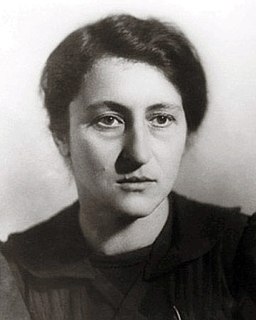
Wanda Wasilewska, also known by Russian name Vanda Lvovna Vasilevskaya, was a Polish and Soviet novelist and journalist and a left-wing political activist. She was a socialist who became also a devoted communist. She fled the German attack on Warsaw in September 1939 and took up residence in Soviet-occupied Lviv and eventually in the Soviet Union. She was the founder of the Union of Polish Patriots there and played an important role in the creation of the 1st Tadeusz Kościuszko Infantry Division. The division developed into the Polish People's Army and fought on the Eastern Front during World War II. Wasilewska was a trusted consultant to Joseph Stalin and her influence was essential to the establishment of the Polish Committee of National Liberation in July 1944 and to the formation of the Polish People's Republic. Wasilewska negotiated with Stalin Poland's post-war borders. The borders attained conformed to Wasilewska's views of where they should be and represented the furthest extension of the country's territory that could be considered at the time, from the point of view of the Soviets and of the Western Allies.

The Greens is a political party in Poland.
Anti-abortion feminism or pro-life feminism is the opposition to abortion by some feminists. Anti-abortion feminists may believe that the principles behind women's rights also call them to oppose abortion on right to life grounds and that abortion hurts women more than it benefits them.
According to one scholarly postulation, the history of feminism in Poland can be divided into seven periods, beginning with the 19th century first-wave feminism. The first four early periods coincided with the foreign partitions of Poland, which resulted in the elimination of the sovereign Polish state for 123 years. However, if one defines "first wave feminism" as Betty Friedan and others have as a global movement in the 19th and 20th centuries mainly concerned with women's right to vote, then Poland experienced this at the same time as other Western countries, toward the end of the 19th, and especially at the beginning of the 20th century. The period prior to this was dominated by the "women's question", when elite women and a few men challenged the subordination of women to men, but did not necessarily advocate or collectively organize for equal political rights, nor vast social change. In Polish lands, the women's question developed alongside continental European debate from the 16th century onward.
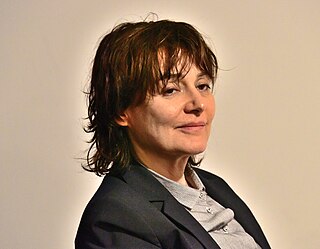
Kazimiera Szczuka is a Polish historian of literature, literary critic, feminist, journalist and television personality, known from the Polish edition of The Weakest Link.

The National Organization for Women (NOW) is an American feminist organization. Founded in 1966, it is legally a 501(c)(4) social welfare organization. The organization consists of 550 chapters in all 50 U.S. states and in Washington, D.C. It is the largest feminist organization in the United States with around 500,000 members. NOW is regarded as one of the main liberal feminist organizations in the US, and primarily lobbies for gender equality within the existing political system. NOW campaigns for constitutional equality, economic justice, reproductive rights, LGBTQIA+ rights and racial justice, and against violence against women.

Agnieszka Graff-Osser, is a Polish writer, translator, commentator, feminist and women's and human rights activist. She studied in Oxford University, Amherst College, and graduated from School of Social Sciences at Polish Academy of Sciences. She completed her PhD in English literature in 1999. In 2001 she published World without women, which was nominated to Nike Award in 2002. She works at the Warsaw University's Institute of the Americas and Europe, and gives lectures on gender studies.
Krytyka Polityczna is a circle of Polish left-wing intellectuals gathered around a journal of the same title founded by Sławomir Sierakowski in 2002 but is open to voices from across the political spectrum. The name draws on the tradition of Young Poland’s "Krytyka", a monthly magazine published by Wilhelm Feldman at the beginning of the 20th century, and on the samizdat "Krytyka" which served as a forum for opposition writers and journalists in the 1970s and 1980s.
Abortion in Poland is legal only in cases when the pregnancy is a result of a criminal act or when the woman's life or health is in danger. The last change in the Act on Pregnancy Planning of the Republic of Poland took place on 27 January 2021, when publication of the judgment of the Polish Constitutional Tribunal in the Dziennik Ustaw RP took place.

Magdalena Środa is a Polish feminist politician and philosopher, extraordinary professor of ethics at the University of Warsaw, and a feminist author. She is also a columnist for the Gazeta Wyborcza. She was government's Plenipotentiary for the Equal Status of Women and Men in the cabinet of Marek Belka between August 16, 2004 and November 4, 2005.
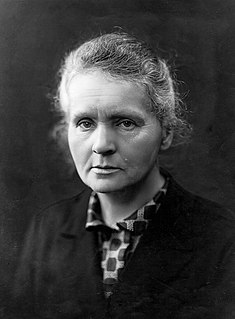
The character of Polish women is shaped by Poland's history, culture, and politics. Poland has a long history of feminist activism, and was one of the first nations in Europe to enact women's suffrage. It is also strongly influenced by the conservative social views of the Catholic Church.

Sylwia Chutnik is a Polish novelist, writer, feminist and social activist.

Tomasz Kitliński is a Polish political philosopher, cultural and social analyst, and civic activist. He is a lecturer and trade unionist at Maria Curie-Sklodowska University and an author of books, articles, petitions and letters of protest. In his research and teaching, he deals with contemporary society, culture and politics, intellectual history, literary and critical theory, art practice, religious studies and social anthropology. In his activism, he champions women's, LGBT, labour and refugee rights and participation.
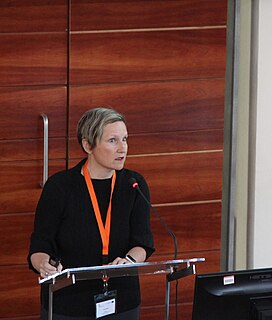
Lori Brown is the co-founder of ArchiteXX, a group dedicated to transforming the architecture profession for women. She is a registered architect, author and associate professor at Syracuse University. Her research focuses on architecture and social justice issues with particular emphasis on gender and its impact upon spatial relationships. She is a member of both the American Institute of Architects and the American Association of University Women.

Kazimiera Iłłakowiczówna was a Polish poet, prose writer, playwright and translator. She was one of the most acclaimed and celebrated poets during Poland's interwar period.

The anti-gender movement is an international movement which opposes what it refers to as gender ideology, gender theory, or genderism. These concepts do not have a coherent definition and cover a variety of issues. Members of the anti-gender movement include right-wingers, right-wing populists, conservatives, and Christian fundamentalists. Members of the anti-gender movement oppose some LGBT rights and some reproductive rights.

The 2020–2021 Women Strike protests in Poland commonly called the Women Strike, were anti-government demonstrations and protests in Poland that began on 22 October 2020, in reaction to a ruling of the Constitutional Tribunal, mainly consisting of judges who were appointed by the ruling Law and Justice dominated United Right, which tightened the law on abortion in Poland. The ruling made almost all cases of abortion illegal, including those cases in which the foetus had a severe and permanent disability, or an incurable and life-threatening disease. All-Poland Women's Strike was charged by the authorities for having illegally organised the protests.
The Consultative Council is a non-Government council created on 1 November 2020 by All-Poland Women's Strike in the context of the October 2020 Polish protests.
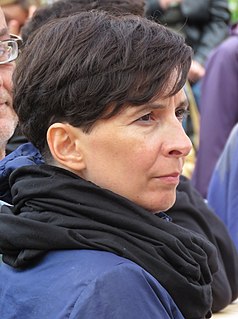
Klementyna Suchanow is a Polish author, editor, and activist. She is the co-founder of the women's rights movement All-Poland Women's Strike.
References
- ↑ Heinen, Jacqueline (2010). "Reproductive Rights in Poland: when politicians fear the wrath of the Church". Third World Quarterly. 31 (6): 1007–1021.
- ↑ Graff, Agnieszka. "You are not alone! The Birth of "Grassroots Feminism" in Poland". SWITCH. Retrieved 1 December 2019.
- ↑ Podgórska, Joanna (30 October 2011). "Duża awantura wokół dużej książki". Polityka. Retrieved 1 December 2019.
- ↑ "Bratkowska: komunizm to najbardziej proludzki ustrój". Gość Niedzielny. 3 January 2014. Retrieved 1 December 2019.